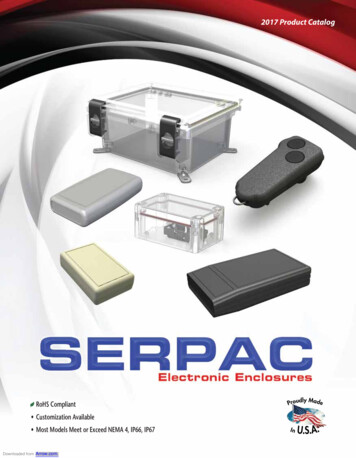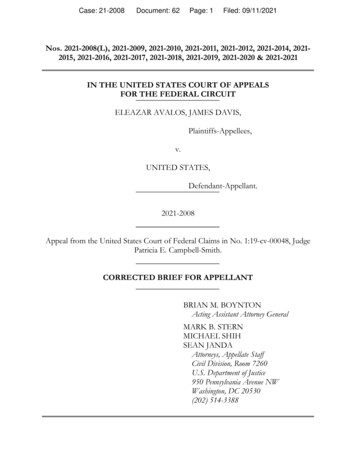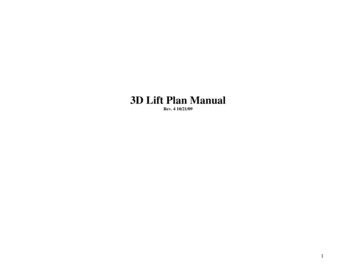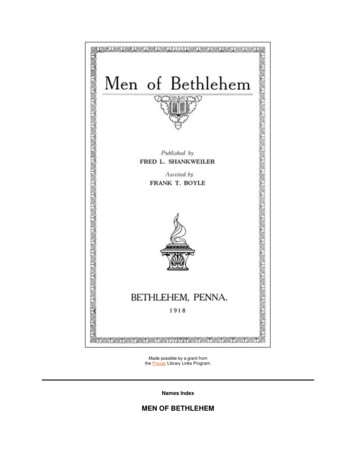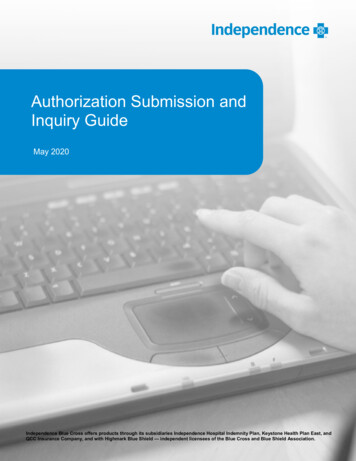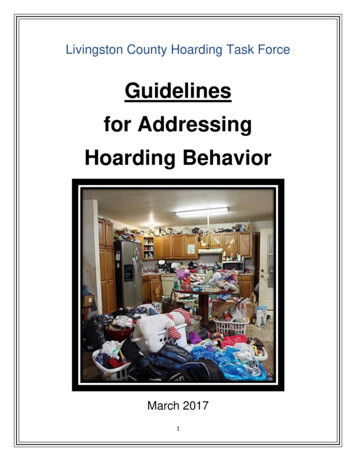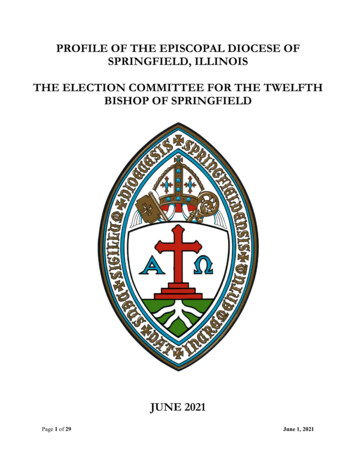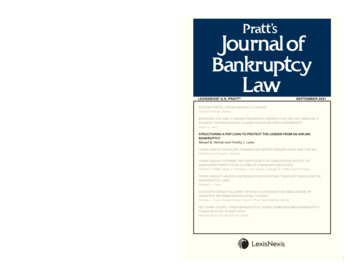
Transcription
PC / Ivory Vellum Carnival 35x23 / 80PRALEXISNEXIS A.S. PRATT SEPTEMBER 2021EDITOR’S NOTE: CROSS-DEFAULT CLAUSESVictoria Prussen SpearsBRIDGING THE GAP: A HEDGE PROVIDER’S PERSPECTIVE ON THE LIMITS OF ABLANKET CROSS-DEFAULT CLAUSE IN ISDA MASTER AGREEMENTSAaron J. LevySTRUCTURING A PDP LOAN TO PROTECT THE LENDER FROM AN AIRLINEBANKRUPTCYStewart B. Herman and Timothy J. LynesTHIRD CIRCUIT RESOLVES TRIANGULAR SETOFF DEBATE ONCE AND FOR ALLMatt Barr and Ryan C. RolstonTHIRD CIRCUIT AFFIRMS THE SUFFICIENCY OF PUBLICATION NOTICE TODISCHARGE PREPETITION CLAIMS OF UNKNOWN CREDITORSRobert A. Britton, Brian S. Hermann, John Weber, Claudia R. Tobler, and Xu PangTHIRD CIRCUIT HOLDS FILM PRODUCTION CONTRACT WAS NOT EXECUTORY INBANKRUPTCY CASEMichael L. CookELEVENTH CIRCUIT ALLOWS ARTICLE III STANDING FOR DISCLOSURE OFSENSITIVE INFORMATION RELATING TO DEBTAndrew J. Tuck, Donald Houser, Alan F. Pryor, and Stephen SimrillNOT IN MY COURT: TEXAS BANKRUPTCY JUDGE DISMISSES NRA BANKRUPTCYCASES AS FILED IN BAD FAITHMichael Rupe and Stephen M. BlankDate: 7/26/2021 Page Count: 60 PPI: 340 Spine width: 0.1765 in
Pratt’s Journal of BankruptcyLawVOLUME 17NUMBER 6September 2021Editor’s Note: Cross-Default ClausesVictoria Prussen Spears281Bridging the Gap: A Hedge Provider’s Perspective on the Limitsof a Blanket Cross-Default Clause in ISDA Master AgreementsAaron J. Levy284Structuring a PDP Loan to Protect the Lender from an AirlineBankruptcyStewart B. Herman and Timothy J. Lynes309Third Circuit Resolves Triangular Setoff Debate Once andfor AllMatt Barr and Ryan C. Rolston316Third Circuit Affirms the Sufficiency of Publication Notice toDischarge Prepetition Claims of Unknown CreditorsRobert A. Britton, Brian S. Hermann, John Weber,Claudia R. Tobler, and Xu Pang319Third Circuit Holds Film Production Contract Was NotExecutory in Bankruptcy CaseMichael L. Cook323Eleventh Circuit Allows Article III Standing for Disclosure ofSensitive Information Relating to DebtAndrew J. Tuck, Donald Houser, Alan F. Pryor, and Stephen Simrill328Not in My Court: Texas Bankruptcy Judge Dismisses NRABankruptcy Cases as Filed in Bad FaithMichael Rupe and Stephen M. Blank331
QUESTIONS ABOUT THIS PUBLICATION?For questions about the Editorial Content appearing in these volumes or reprint permission,please call:Kent K. B. Hanson, J.D., at . 415-908-3207Email: . kent.hanson@lexisnexis.comOutside the United States and Canada, please call . . . . . . . . . . . . . . . (973) 820-2000For assistance with replacement pages, shipments, billing or other customer service matters,please call:Customer Services Department at . . . . . . . . . . . . . . . . . . . . . . . . . . (800) 833-9844Outside the United States and Canada, please call . . . . . . . . . . . . . . . (518) 487-3385Fax Number . . . . . . . . . . . . . . . . . . . . . . . . . . . . . . . . . . . . . . . . (800) 828-8341Customer Service Website . . . . . . . . . . . . . . . . . . . http://www.lexisnexis.com/custserv/For information on other Matthew Bender publications, please callYour account manager or . . . . . . . . . . . . . . . . . . . . . . . . . . . . . . .Outside the United States and Canada, please call . . . . . . . . . . . . . . . .(800) 223-1940(937) 247-0293Library of Congress Card Number: 80-68780ISBN: 978-0-7698-7846-1 (print)ISBN: 978-0-7698-7988-8 (eBook)ISSN: 1931-6992Cite this publication as:[author name], [article title], [vol. no.] PRATT’S JOURNAL OF BANKRUPTCY LAW [page number]([year])Example: Patrick E. Mears, The Winds of Change Intensify over Europe: Recent European UnionActions Firmly Embrace the “Rescue and Recovery” Culture for Business Recovery, 10 PRATT’S JOURNALOF BANKRUPTCY LAW 349 (2014)This publication is designed to provide authoritative information in regard to the subject matter covered. Itis sold with the understanding that the publisher is not engaged in rendering legal, accounting, or otherprofessional services. If legal advice or other expert assistance is required, the services of a competentprofessional should be sought.LexisNexis and the Knowledge Burst logo are registered trademarks of RELX Inc. Matthew Bender, theMatthew Bender Flame Design, and A.S. Pratt are registered trademarks of Matthew Bender Properties Inc.Copyright 2021 Matthew Bender & Company, Inc., a member of LexisNexis. All Rights Reserved.No copyright is claimed by LexisNexis or Matthew Bender & Company, Inc., in the text of statutes,regulations, and excerpts from court opinions quoted within this work. Permission to copy material may belicensed for a fee from the Copyright Clearance Center, 222 Rosewood Drive, Danvers, Mass. 01923,telephone (978) 750-8400.Editorial Office230 Park Ave., 7th Floor, New York, NY 10169 (800) 543-6862www.lexisnexis.com(2021–Pub.4789)
Editor-in-Chief, Editor & Board ofEditorsEDITOR-IN-CHIEFSTEVEN A. MEYEROWITZPresident, Meyerowitz Communications Inc.EDITORVICTORIA PRUSSEN SPEARSSenior Vice President, Meyerowitz Communications Inc.BOARD OF EDITORSSCOTT L. BAENABilzin Sumberg Baena Price & Axelrod LLPANDREW P. BROZMANClifford Chance US LLPMICHAEL L. COOKSchulte Roth & Zabel LLPMARK G. DOUGLASJones DayMARK J. FRIEDMANDLA PiperSTUART I. GORDONRivkin Radler LLPPATRICK E. MEARSBarnes & Thornburg LLPiii
Pratt’s Journal of Bankruptcy Law is published eight times a year by Matthew Bender &Company, Inc. Copyright 2021 Matthew Bender & Company, Inc., a member of LexisNexis.All Rights Reserved. No part of this journal may be reproduced in any form—by microfilm,xerography, or otherwise—or incorporated into any information retrieval system without thewritten permission of the copyright owner. For customer support, please contact LexisNexisMatthew Bender, 9443 Springboro Pike, Miamisburg, OH 45342 or call Customer Support at1-800-833-9844. Direct any editorial inquiries and send any material for publication to StevenA. Meyerowitz, Editor-in-Chief, Meyerowitz Communications Inc., 26910 Grand yerowitz@meyerowitzcommunications.com, 631.291.5541. Material for publication iswelcomed—articles, decisions, or other items of interest to lawyers and law firms, in-housecounsel, government lawyers, senior business executives, and anyone interested in privacy andcybersecurity related issues and legal developments. This publication is designed to be accurateand authoritative, but neither the publisher nor the authors are rendering legal, accounting, orother professional services in this publication. If legal or other expert advice is desired, retain theservices of an appropriate professional. The articles and columns reflect only the presentconsiderations and views of the authors and do not necessarily reflect those of the firms ororganizations with which they are affiliated, any of the former or present clients of the authorsor their firms or organizations, or the editors or publisher.POSTMASTER: Send address changes to Pratt’s Journal of Bankruptcy Law, LexisNexis MatthewBender, 230 Park Ave. 7th Floor, New York NY 10169.iv
Structuring a PDP Loan to Protect the Lenderfrom an Airline BankruptcyBy Stewart B. Herman and Timothy J. Lynes*The authors advise that a secured lender in a “PDP” transaction using a structure withan assignment of rights under a purchase agreement should take reasonable steps toperfect a security interest in the assigned rights on a precautionary basis.The purchase agreement between an aircraft manufacturer and its customerwill call for the customer to pay installments of the purchase price between thetime the agreement is entered into and the delivery of the aircraft. Theseinstallments are called progress payments or predelivery payments (“PDPs”) andcan be significant, especially in regard to a fleet purchase over many years.Normally the aircraft buyer pays the PDPs with its own funds. It may financethe PDPs, particularly if it also wishes to conclude a longer-term debt orsale-leaseback financing for the ultimate purchase of the aircraft at delivery.A PDP financing is a secured financing. It is not secured by the aircraft,however, because the aircraft has not yet been manufactured and delivered. Itis instead secured by an assignment of the rights of the customer in the purchaseagreement. The rights reflect the property interest of the customer in thepurchase agreement itself, including the aircraft delivery position. Subject to theconsent of the aircraft manufacturer seller, the finance party may be assigned theright of the customer to purchase the aircraft when it is complete after an eventof default under the PDP financing or the right to a full or partial refund of thePDPs.In a recent bankruptcy case, King v. Bombardier Aerospace Corporation, et al.,1the U.S. Bankruptcy Court for the Central District of California, Los AngelesDivision) (“King v. Bombardier”), the court considered the financing of PDPsfor the purchase by the debtors of new Bombardier aircraft for their fleet. Thecourt considered whether the assignment of the aircraft purchase agreement tothe PDP financer constituted an absolute assignment or merely an assignmentfor security.The distinction was crucial: If the assignment were an absolute assignment,the PDP financer would be able to recover all of the PDPs it had paid to the*Stewart B. Herman, a partner with Katten Muchin Rosenman LLP, represents clients incommercial- and business-aircraft transactions. Timothy J. Lynes, managing partner of the firm’soffice in Washington, D.C., is chair of the firm’s Aviation Finance practice. The authors may becontacted at stewart.herman@katten.com and timothy.lynes@katten.com, respectively.1King v. Bombardier Aerospace Corp., et al., Case No. 2:17-bk-21386-SK, Adv. No.2:19-ap-01147 SK (October 15, 2020).309
PRATT ’S JOURNALOFBANKRUPTCY LAWmanufacturer, less an amount to be retained by the manufacturer under thepurchase agreement as liquidated damages.By contrast, if the assignment were merely an assignment for security, therefund from the manufacturer would be distributed among all of the customer’sunsecured creditors—including the PDP financer, with the result that the PDPfinancer’s recovery would be expected to be much lower.THE CASEIn 2017, charter-jet company Zetta Jet USA, Inc., a California corporation(“Zetta USA”) and its affiliate Zetta Jet PTE, Ltd., a Singapore company(“Zetta PTE,” together with Zetta USA, the “Debtors”), filed for protection asdebtors under Chapter 11 of the U.S. Bankruptcy Code. The case was laterconverted to a Chapter 7 liquidation.AVIC International Leasing Co., Ltd. (“AVIC”) provided financing, supported by Export Development Canada (“EDC”), for the purchase by ZettaUSA of four new Bombardier Global 6000 aircraft. For this purpose, AVICformed a special-purpose subsidiary called CAVIC Aviation Leasing (Ireland)22 Co., Designated Activity Company (“CAVIC”).In 2015, Zetta PTE entered into an Aircraft Purchase Agreement (the“APA”) with Bombardier Inc. for the manufacturer and sale of four newBombardier Global 6000 aircraft. The APA stated that it was to be governed byNew York law.In 2016, CAVIC (as borrower) and EDC (as agent, security trustee andlender) entered into a PDP Facility Agreement for one of the aircraft underwhich EDC agreed to make available to CAVIC a revolving credit facility in theamount of 30 million. The PDP Facility Agreement stated that its purpose wasfor CAVIC to apply all amounts it borrowed to finance the PDPs dueBombardier under the APA.Zetta PTE (as assignor), CAVIC as (assignee) and Bombardier entered intoan assignment of the Aircraft Purchase Agreement (the “APA Assignment”). TheAPA Assignment also stated that it was to be governed by New York law.Bombardier, EDC, CAVIC and the trustee under an owner trust intended tobe the titleholder of the aircraft once delivered, entered into a consent in whichBombardier consented to the grant of the security interest in the APA in favorof EDC, and to a forward purchase agreement between CAVIC and the ownertrustee. Bombardier also agreed that when the APA called for a refund to thebuyer of advance payments, Bombardier would pay the PDPs to be refunded toEDC.310
STRUCTURINGAPDP LOAN TO PROTECT THE LENDERFROM ANAIRLINE BANKRUPTCYCAVIC and EDC also entered into a security assignment by which CAVICgranted EDC a security interest in the rights of CAVIC in the APA under theAPA Assignment.Through the forward purchase agreement, a head lease and a sublease, eachaircraft once delivered by Bombardier would come to be owned by the ownertrust of which CAVIC would be the beneficiary, leased under a finance lease toanother trust of which Zetta PTE would be the beneficiary, and subleased toZetta USA. The head lease had a bargain purchase option, making the leasestructure a disguised secured loan.For one of the four aircraft, before that aircraft was delivered new byBombardier, but after 30 million for that aircraft had been lent by EDC andpaid to Bombardier in PDPs, the Debtors sought Chapter 11 protection. Thebankruptcy constituted an event of default under the APA, leading Bombardierto terminate the APA, which required that Bombardier return an amount equalto the PDPs for the undelivered aircraft funded by EDC, less an amount forliquidated damages specified in the APA (the “Refund Amount”).THE PARTIES’ ARGUMENTSCAVIC argued to the court that (subject to EDC’s security interest) CAVICwas the absolute owner of the Refund Amount by virtue of the APAAssignment because the APA Assignment was an absolute assignment and notmerely an assignment for security. CAVIC pointed out that the APA Assignment stated that the assignment was absolute, and that CAVIC became the solebuyer of the aircraft under the APA, obligating CAVIC to purchase the aircraftand pay the balance of the purchase price. CAVIC noted it was also obligatedto repay the 30 million loan extended by EDC to finance the payment of thePDPs.CAVIC additionally pointed out that Bombardier had signed a consent thatstated that if the Refund Amount became payable, Bombardier would pay itdirectly to EDC as secured lender, not to either of the Debtors.In response, the bankruptcy trustee administering the Debtors’ estate arguedthat the Refund Amount was the property not of EDC or CAVIC, but of theDebtors’ estate, and accordingly should be turned over by Bombardier to thetrustee so the trustee could distribute it to all of the Debtors’ unsecuredcreditors, not just to EDC or CAVIC.The trustee claimed that the APA Assignment, rather than being an absoluteassignment, was actually an assignment for security only, and that it would haveto have been perfected by CAVIC when the loan was extended in order forCAVIC to have priority against the Debtors’ unsecured creditors.311
PRATT ’S JOURNALOFBANKRUPTCY LAWThe trustee argued that because the interest of CAVIC was actuallyunperfected, it was subject to avoidance under Section 544 of the BankruptcyCode. Once CAVIC’s interest was avoided, neither CAVIC nor its securityassignee EDC would have any security interest in the Refund Amount and theRefund Amount would be distributable to the Debtors’ unsecured creditors prorata.The trustee further reasoned that the court should determine what type ofassignment the APA Assignment was by determining the parties’ intent and bylooking beyond the words of the agreements, including disregarding the wordsstating that the assignment was absolute. In this regard, the trustee pointed outthat Zetta PTE remained jointly liable with CAVIC for the obligations of the“buyer” under the APA, and that the Debtors could extinguish CAVIC’s rightsin the Refund Amount by repaying the EDC’s PDP loan. Finally, the trusteeargued that the fact that the assignment of the APA to CAVIC was made at thesame time as the security assignment from CAVIC to the EDC suggested theAPA Assignment was itself also a security assignment.THE COURT’S DECISIONThe court in King v. Bombardier ultimately rejected the arguments of thetrustee and found that the APA Assignment was absolute, and not a securityassignment that could be set aside if not perfected. In reaching its decision, thecourt noted that other courts in a variety of cases have applied a number offactors to determine if an assignment is absolute or only an assignment forsecurity. These factors are: The plain language of the assignment agreement; The timing of the assignment and of the making of the related loan; Whether the payments received under the assignment would be appliedto reduce the principal amount of the loan; Whether the assignment will be a source of payment if the loan is notrepaid; Whether any excess paid on the loan will be remitted to the assignor; Whether the assignee retains a right to deficiency if the assignment doesnot satisfy the amount of the loan; Whether the assignee’s rights in the assigned property would beextinguished if the assignor paid the debt from another source; and Whether in a bankruptcy the assignee filed proofs of claim or other312
STRUCTURINGAPDP LOAN TO PROTECT THE LENDERFROM ANAIRLINE BANKRUPTCYdocuments asserting it was a secured party.2This is a wide variety of factors and, viewed with a critical eye, does notprovide a roadmap to assure at the time a transaction is entered into, that anassignment will ultimately be determined to be an absolute assignment orassignment for security. The court apparently was not completely comfortableanalyzing a structured financing, and called the agreements a “patchwork.”Ultimately, the court ruled that the assignment was an absolute assignmentand not one merely for security. The court relied heavily on the first factor citedabove—i.e., the fact that the APA Assignment recited that the assignment fromthe original buyer Zetta PTE to CAVIC was an “absolute” assignment of all ofZetta PTE’s “rights, interests, liabilities and obligations” under the APA and didnot formally recite that it was an assignment for security.Although the court found that the assignment was an absolute assignmentand not merely one for security, the court could easily have gone the other wayand found from the facts that the APA Assignment was actually one for securityonly.Another court, presented with similar facts, could readily find that the APAAssignment was for security. In the APA Assignment, Zetta PTE purported toassign absolutely all of Zetta PTE’s rights and obligations under the APA toCAVIC, the counterparty to the APA.However, Bombardier consented to this assignment because Zetta PTE alsoagreed to remain jointly and severally liable with CAVIC to perform theobligations of the buyer under the APA. Therefore, as far as Bombardier wasconcerned, its original buyer, Zetta PTE, remained obligated to pay the fullpurchase price of the aircraft and otherwise perform the covenants of the buyerunder the APA.A release of Zetta PTE apparently would not have been acceptable toBombardier; CAVIC was not an operating company, but only a special-purposeentity formed for the purpose of participating in the structured financing ofZetta PTE’s purchase of the aircraft. Accordingly, Zetta PTE remained liable forits bankruptcy event of default even after the effectiveness of the APAAssignment.One could argue that if the parties really had intended the assignment underthe APA Assignment to be an absolute assignment, so that the rights andobligations of the purchaser under the APA were fully transferred to anotherparty, perhaps they would not have provided that the bankruptcy of the original2King v. Bombardier, pp. 47–52.313
PRATT ’S JOURNALOFBANKRUPTCY LAWpurchaser would cause the APA to terminate. An assignment that does nottransfer the ultimate obligations of the assignor is a typical element of anassignment for security only.Another factor that could have been viewed to weigh in favor of finding theAPA Assignment a security assignment rather than an absolute assignment isthe role of the assignee in the structured financing. If the assignee had been anequity investor in the aircraft, taking residual risk, it would be more logical forit to receive an absolute assignment.In the case at hand, by contrast, the aircraft financing for Zetta was entirelya debt financing. Neither EDC nor CAVIC was intended to have any residualinterest in the aircraft once the financing was repaid. Instead, once the financingwas repaid, EDC and CAVIC were to release their interests in the APA and theother transaction documents, and Zetta PTE would become the owner of theaircraft and the owner of any remaining rights under the APA.As noted above, if the court had accepted the arguments of the trustee andruled that the assignment were merely one for security, the result would havebeen that the “security interest” of the APA Assignment would have beendisregarded. This is because CAVIC had not taken any action to perfect thissecurity interest. Therefore, the Refund Amount would have become theproperty of the Debtors’ estate, distributable to the Debtors’ unsecuredcreditors rather than to CAVIC for onward payment to EDC to be applied tothe repayment of the EDC loan. The fact that EDC itself had a perfectedsecurity interest would not have changed the result because EDC’s rights werederivative of CAVIC’s; EDC could not have a perfected security interest in thePDPs if CAVIC did not.To protect against the possibility that a purportedly absolute assignment isrecharacterized as a security assignment, the assignee may on a precautionarybasis take steps to perfect before it extends the loan. CAVIC could haveconsidered the following: Having Zetta PTE, a Singapore company, execute a Singapore-lawpledge or assignment in favor of CAVIC, and filing that agreement inthe appropriate charges registry in Singapore; Creating and taking possession of a chattel-paper copy of the APA; and Filing a precautionary UCC-1 financing statement in the United States(with the District of Columbia Recorder of Deeds because Zetta PTEwas not a U.S. entity).314
STRUCTURINGAPDP LOAN TO PROTECT THE LENDERFROM ANAIRLINE BANKRUPTCYCONCLUSIONAlthough the court in King v. Bombardier ultimately ruled in favor of CAVICand EDC, the facts that (1) the original buyer, Zetta PTE, remained jointly andseverally liable to perform the obligations of the buyer under the APA; (2) theassignee was a special-purpose entity with no creditworthiness; and (3) abankruptcy of Zetta PTE triggered a default under the APA, allowed the trusteeto mount the argument that the APA Assignment was an assignment forsecurity, despite the recitation in the APA Assignment that it was an absoluteassignment.Therefore, it is advisable that a secured PDP lender using a structure with anassignment of rights under a purchase agreement take reasonable steps toperfect a security interest in the assigned rights on a precautionary basis.315
sale-leaseback financing for the ultimate purchase of the aircraft at delivery. A PDP financing is a secured financing. It is not secured by the aircraft, however, because the aircraft has not yet been manufactured and delivered. It is instead secured by an assignment of the rights of the customer in the purchase agreement.
